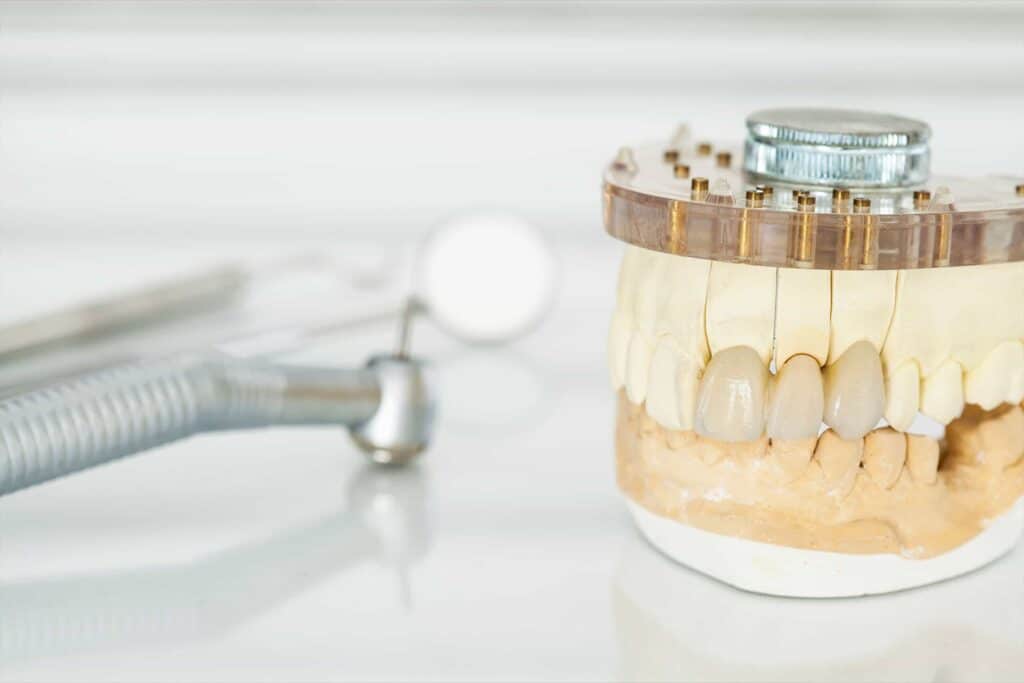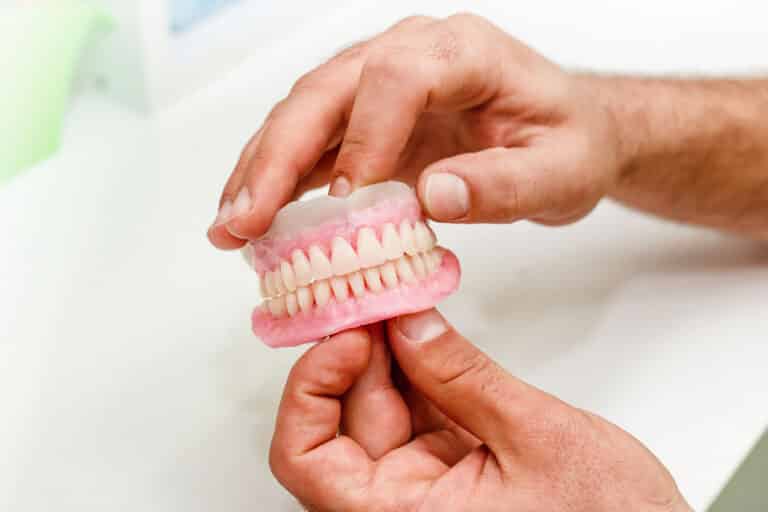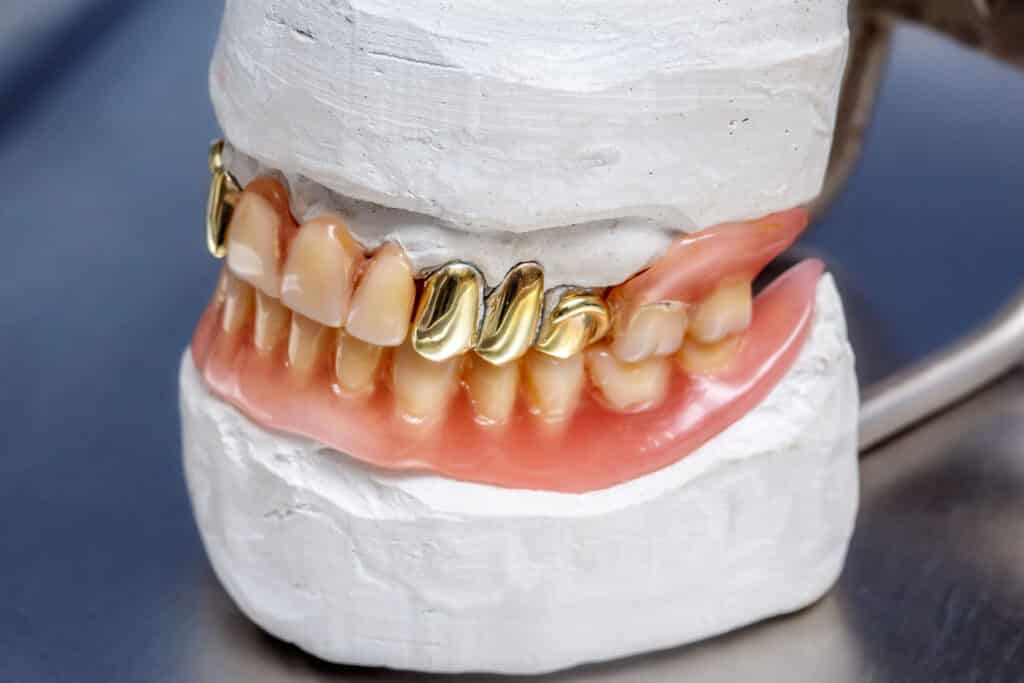From biting to chewing throughout the day, dentures are designed to withstand your usual wear and tear. But dentures break because they aren’t as durable as natural teeth. They also aren’t going to last a lifetime, so chances are you’ll need to repair or replace a broken denture at some point.
But don’t panic if you have a broken denture. Follow this guide on how to fix your broken denture so it doesn’t impact your day-to-day life.
How Can I Repair a Broken Denture?
There are a few ways to repair a broken denture, however keep in mind that not all them are the same. Depending on the material type and what broke, dentures may not be able to be repaired unless by a professional. Even then sometimes they cannot be repaired and a new one must be made.
However if it is a simple fix, there are plenty of over the counter products to help you repair your dentures. Whether it’s partial denture repair or the full set, many denture repair kits allow you to:
- Replace missing or broken teeth
- Reline loose dentures
- Fix any cracks
Do It Yourself: Using an At Home Denture Repair Kit
Some feature acrylic to attach any broken teeth to damaged dentures, whereas some have thermal polymer beads. It would be best to speak to a dentist first prior to attempting to fix them as improper repair can result in misalignment and the inability to bite or wear the dentures.
This isn’t a long-term solution, though. You can buy a denture repair kit over the counter for emergency repair. Only use them in emergencies as you wait for an appointment to receive professional help.
Don’t Use Superglue!
You should also avoid the product most people grab first — superglue or Gorilla Glue. Avoid superglue at all costs as it isn’t waterproof. It’ll damage dentures and even cause gum problems. Superglue isn’t the same as medical-grade adhesives doctors or dentists use and the additives aren’t safe for consumption.
Professional Dental Repair Services
Another option you have is to research professional denture repair services. The prices and turnaround times will depend on the business and package you choose, most of which provide a long term solution.
What Are My Dentures Made Out Of?
Various dental materials are used for dentures, including acrylic, nylon, resin, metal or porcelain. This all depends on the manufacturer of your dentures and the materials they choose. The denture framework also features acrylic, metal or nylon.
If you have partial dentures, then it might be made of an acrylic base with metal clasps. While full dentures typically are made of acrylic, there are some combinations that use nylon or even metal and porcelain.
The dentures also have false teeth, typically made up of resin or porcelain. Both help false teeth look natural, but porcelain is generally used for full dentures rather than partial dentures. It also has the color and texture you’d find in real teeth.
The type of dentures you need depends on the state of your mouth. Some dentures need to replace a couple of missing teeth. Others are designed to replace all the teeth, including the tissues and gums.
The Most Common Dentures
Your dentist will recommend the most suitable denture for your needs, but here are the most common types of dentures you’ll come across:
- Complete/full dentures: To replace all missing teeth, tissues and gums.
- Partial dentures (removable): Designed to replace some missing teeth, which you can remove whenever you want.
- Partial dentures (fixed): Replaces some missing teeth, which you can’t remove. This is also known as a bridge and is not what the typical person thinks of when discussing dentures.
- Implant dentures: Also known as ‘snap in dentures’, this style of denture has significantly increased retention which is a very big problem with complete dentures.
- Same-day dentures: Where dentists can extract teeth and install ‘dentures’ during the same appointment. This treatment option is the best way to replace a jaw missing all the teeth.
How Much Does It Cost to Repair Broken Dentures?
It depends on your insurance, dental plans, the specific cost each dentist has. As well as the damage, the type of denture that needs repairing, and many other factors.
There are also different types of denture repair, such as mail-in options where you don’t need to travel to multiple appointments in person.
Depending on how much damage your denture has suffered and the type of dentures you have, you’ll find costs can start from around $50 but easily climb into the hundreds.
Remember, minor damage to partial dentures could be cheaper than heavily damaged full dentures. In some cases, new dentures could be the cheaper option.
How Long Does It Take for a Dentist to Fix My Dentures?
Again, this comes down to a handful of factors. What sort of dentures need repairing? How damaged are they, are they broken in half? Your denture repair could take as long as a few weeks (especially if the teeth also need work), but could also be fixed as quickly as 24 hours.
How Can I Prevent My Dentures From Breaking?
Safeguarding dentures isn’t easy. They get damaged as they suffer from wear and tear as you chew and bite. Obviously, you can’t avoid that entirely, but there are ways you can prevent them from breaking easily.
The Safest Ways to Clean and Maintain Your Dentures
- Handle them carefully when you remove them.
- Have a soft landing spot, such as a sink filled with water or a towel, in case you drop them.
- Remove and rinse your dentures after every meal.
- Remove your dentures every night and soak them.
- Don’t continue wearing damaged dentures or partial dentures.
- Carefully choose the type of toothbrush and toothpaste you use.
- Treat them like you would your normal teeth — look after them!
What Are the Risks of Repairing My Own Broken Dentures?
Always think twice before attempting partial denture or full denture repairs at home. First off, you need to think about the misalignment. Even a small mistake can cause more damage to your tongue, gum and cheeks.
Only use a denture repair kit for an emergency repair. This is a temporary fix, and should not be seen as a permanent want to fix your dentures. You also won’t have the specialist equipment. Drills, buffers, vices, padded mads, curing lights — nobody at home has medical-grade equipment lying around.
Glues also feature toxic materials. Even when it’s dry and set, glues won’t hold up when you begin eating or drinking, causing you to ingest toxic substances. That’s not to mention the unseen damage. Can you confidently notice a hairline fracture or crack at home? Unseen damage can lead to even more issues.
Then there’s the warranty. Read the fine print to see if trying to fix your dentures yourself will void the warranty.
Can My Dentist Fix My Denture If I Mess It Up?
Maybe. Maybe not. It depends on how the dentures have broken. If the damage is minor, then they might. You can temporarily fix them with a repair kit, but always see a dentist for a long term fix.
Also, there’s no guarantee a dentist can undo your handiwork, especially if you getting your DIY on means you void your warranty.
Was this post helpful?
Table of Contents
- How Can I Repair a Broken Denture?
- What Are My Dentures Made Out Of?
- How Much Does It Cost to Repair Broken Dentures?
- How Long Does It Take for a Dentist to Fix My Dentures?
- How Can I Prevent My Dentures From Breaking?
- What Are the Risks of Repairing My Own Broken Dentures?
- Can My Dentist Fix My Denture If I Mess It Up?





